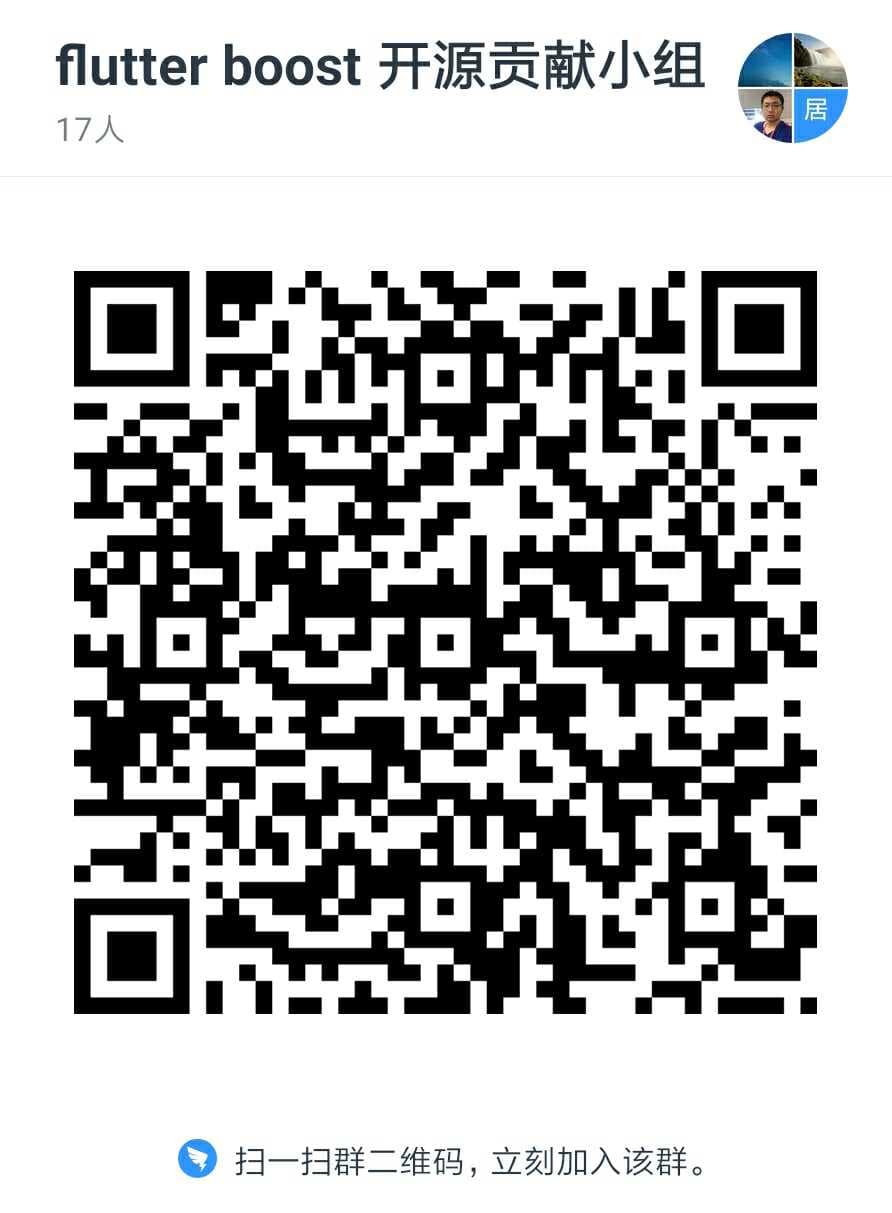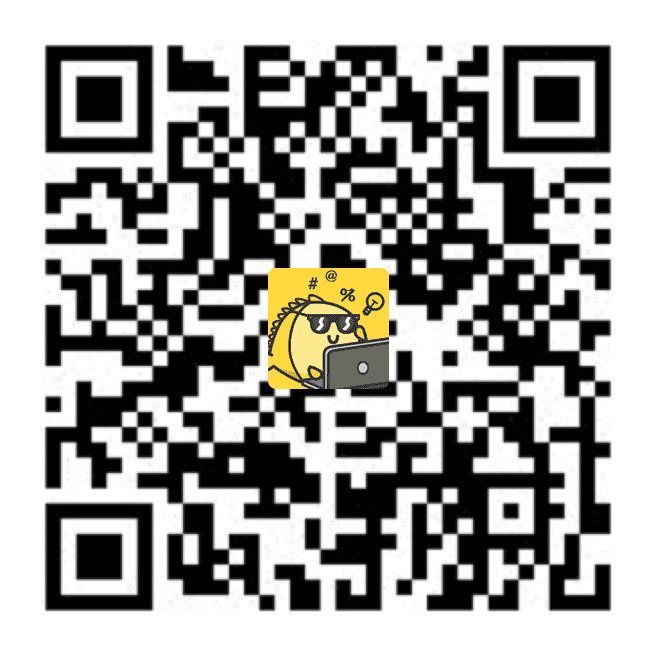Currently, version 1.9 of flutter is supported.
flutter branch:v1.9.1-hotfixes
FlutterBoost branch:feature/flutter_1.9_upgrade
FlutterBoost for androidx branch:feature/flutter_1.9_androidx_upgrade
flutter_boost:
git:
url: 'https://github.com/alibaba/flutter_boost.git'
ref: 'feature/flutter_1.9_upgrade'dingding group:
Please checkout the release note for the latest 0.1.54 to see changes 0.1.54 release note
A next-generation Flutter-Native hybrid solution. FlutterBoost is a Flutter plugin which enables hybrid integration of Flutter for your existing native apps with minimum efforts.The philosophy of FlutterBoost is to use Flutter as easy as using a WebView. Managing Native pages and Flutter pages at the same time is non-trivial in an existing App. FlutterBoost takes care of page resolution for you. The only thing you need to care about is the name of the page(usually could be an URL).
You need to add Flutter to your project before moving on.The version of the flutter SDK requires v1.5.4-hotfixes, or it will compile error.
Open you pubspec.yaml and add the following line to dependencies:
flutter_boost: ^0.1.54or you could rely directly on a Github project tag, for example(recommended)
flutter_boost:
git:
url: 'https://github.com/alibaba/flutter_boost.git'
ref: '0.1.54'Add init code to you App
void main() => runApp(MyApp());
class MyApp extends StatefulWidget {
@override
_MyAppState createState() => _MyAppState();
}
class _MyAppState extends State<MyApp> {
@override
void initState() {
super.initState();
///register page widget builders,the key is pageName
FlutterBoost.singleton.registerPageBuilders({
'sample://firstPage': (pageName, params, _) => FirstRouteWidget(),
'sample://secondPage': (pageName, params, _) => SecondRouteWidget(),
});
}
@override
Widget build(BuildContext context) => MaterialApp(
title: 'Flutter Boost example',
builder: FlutterBoost.init(), ///init container manager
home: Container());
}Note: You need to add libc++ into "Linked Frameworks and Libraries"
Use FLBFlutterAppDelegate as the superclass of your AppDelegate
@interface AppDelegate : FLBFlutterAppDelegate <UIApplicationDelegate>
@endImplement FLBPlatform protocol methods for your App.
@interface PlatformRouterImp : NSObject<FLBPlatform>
@property (nonatomic,strong) UINavigationController *navigationController;
+ (PlatformRouterImp *)sharedRouter;
@end
@implementation PlatformRouterImp
- (void)openPage:(NSString *)name
params:(NSDictionary *)params
animated:(BOOL)animated
completion:(void (^)(BOOL))completion
{
if([params[@"present"] boolValue]){
FLBFlutterViewContainer *vc = FLBFlutterViewContainer.new;
[vc setName:name params:params];
[self.navigationController presentViewController:vc animated:animated completion:^{}];
}else{
FLBFlutterViewContainer *vc = FLBFlutterViewContainer.new;
[vc setName:name params:params];
[self.navigationController pushViewController:vc animated:animated];
}
}
- (void)closePage:(NSString *)uid animated:(BOOL)animated params:(NSDictionary *)params completion:(void (^)(BOOL))completion
{
FLBFlutterViewContainer *vc = (id)self.navigationController.presentedViewController;
if([vc isKindOfClass:FLBFlutterViewContainer.class] && [vc.uniqueIDString isEqual: uid]){
[vc dismissViewControllerAnimated:animated completion:^{}];
}else{
[self.navigationController popViewControllerAnimated:animated];
}
}
@endInitialize FlutterBoost with FLBPlatform at the beginning of your App, such as AppDelegate.
PlatformRouterImp *router = [PlatformRouterImp new];
[FlutterBoostPlugin.sharedInstance startFlutterWithPlatform:router
onStart:^(FlutterEngine *engine) {
}];Init FlutterBoost in Application.onCreate()
public class MyApplication extends FlutterApplication {
@Override
public void onCreate() {
super.onCreate();
FlutterBoostPlugin.init(new IPlatform() {
@Override
public Application getApplication() {
return MyApplication.this;
}
@Override
public boolean isDebug() {
return true;
}
@Override
public void openContainer(Context context, String url, Map<String, Object> urlParams, int requestCode, Map<String, Object> exts) {
//native open url
}
@Override
public IFlutterEngineProvider engineProvider() {
return new BoostEngineProvider(){
@Override
public BoostFlutterEngine createEngine(Context context) {
return new BoostFlutterEngine(context, new DartExecutor.DartEntrypoint(
context.getResources().getAssets(),
FlutterMain.findAppBundlePath(context),
"main"),"/");
}
};
}
@Override
public int whenEngineStart() {
return ANY_ACTIVITY_CREATED;
}
});
}All page routing requests are being sent to the native router. Native router communicates with Native Container Manager, Native Container Manager takes care of building and destroying of Native Containers.
iOS
FLBFlutterViewContainer *vc = FLBFlutterViewContainer.new;
[vc setName:name params:params];
[self.navigationController presentViewController:vc animated:animated completion:^{}];However, in this way, you cannot get the page data result after the page finished. We suggest you implement the platform page router like the way mentioned above. And finally open/close the VC as following:
//push the page
[FlutterBoostPlugin open:@"first" urlParams:@{kPageCallBackId:@"MycallbackId#1"} exts:@{@"animated":@(YES)} onPageFinished:^(NSDictionary *result) {
NSLog(@"call me when page finished, and your result is:%@", result);
} completion:^(BOOL f) {
NSLog(@"page is opened");
}];
//prsent the page
[FlutterBoostPlugin open:@"second" urlParams:@{@"present":@(YES),kPageCallBackId:@"MycallbackId#2"} exts:@{@"animated":@(YES)} onPageFinished:^(NSDictionary *result) {
NSLog(@"call me when page finished, and your result is:%@", result);
} completion:^(BOOL f) {
NSLog(@"page is presented");
}];
//close the page
[FlutterBoostPlugin close:yourUniqueId result:yourdata exts:exts completion:nil];Android
public class FlutterPageActivity extends BoostFlutterActivity {
@Override
public String getContainerUrl() {
//specify the page name register in FlutterBoost
return "sample://firstPage";
}
@Override
public Map getContainerUrlParams() {
//params of the page
Map<String,String> params = new HashMap<>();
params.put("key","value");
return params;
}
}or
public class FlutterFragment extends BoostFlutterFragment {
@Override
public String getContainerUrl() {
return "flutterFragment";
}
@Override
public Map getContainerUrlParams() {
Map<String,String> params = new HashMap<>();
params.put("tag",getArguments().getString("tag"));
return params;
}
}Dart
FlutterBoost.singleton
.open("pagename")
FlutterBoost.singleton.close(uniqueId);
Please see the example for details.
This project is licensed under the MIT License - see the LICENSE.md file for details
阿里巴巴-闲鱼技术是国内最早也是最大规模线上运行Flutter的团队。
我们在公众号中为你精选了Flutter独家干货,全面而深入。
内容包括:Flutter的接入、规模化应用、引擎探秘、工程体系、创新技术等教程和开源信息。
架构/服务端/客户端/前端/算法/质量工程师 在公众号中投递简历,名额不限哦
欢迎来闲鱼做一个好奇、幸福、有影响力的程序员,简历投递:tino.wjf@alibaba-inc.com
订阅地址


